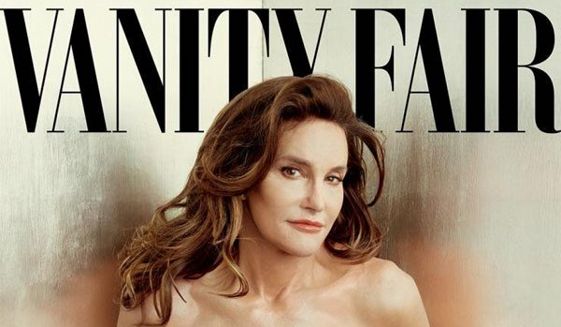New Pronouns for the Traveling Freak Show
By Wesley Pruden
WashingtonTimes.com

Caitlyn Jenner on the
cover of Vanity Fair Associated Press photo
Caitlyn Jenner, taking pride in his or her
decolletage with a smart new frock for his famous
Vanity Fair photo shoot, started the madness of the
summer of ‘15, but he’s got nothing on the
educationist establishment. They’re nothing but
boobs (and proud of it).
The University of Tennessee, once known mostly for football as she was meant to be played, has joined seats of advanced learning in Michigan, Maryland, North Carolina and Vermont in performing imaginative radical surgery on the language. We can be sure that California will not be far behind.
Though the new pronouns are not official university policy, not yet, the university’s Office for Diversity and Inclusion is officially encouraging students, professors, athletes, cooks, parking-lot attendants, groundskeepers, latrine orderlies and many others — everyone who bleeds orange and white — to think not only beyond male and female, but beyond the pronouns used for centuries to describe such creatures. The new, gender-neutral pronouns are “xe,” “xym,” and “xyr.” And you thought “Ms.” (pronounced “Mzz”), invented to describe women who had not yet caught a man, was gross enough.
Not everyone in Knoxville, seat of the university, uses the new pronouns. No one has mastered how to pronounce them, which is “zee,” “zim” and “zur,” or learned which new pronoun should be applied to which of the many sexes that now abound on forward-looking campuses. No one who wants to avoid being called sexist, racist, fascist or speciest will be excused for mispronouncing even one of them.
“We should not assume someone’s gender by their appearance, nor by what is listed on a roster or in student information systems,” says Donna Braquet, a person who is proudly of indeterminate sex and who is the director of the university’s Pride Center. “Transgender people and people who do not identify within the gender binary may use a different name than their legal name and pronouns of their gender identity, rather than the pronouns of the sex they were assigned at birth.”
Got all that? Xe (or Xym or Xyr) Braquet suggests that instructors learn students’ chosen names and chosen pronouns (within the gender binary) during the first few weeks of classes. They can learn to pronounce everyone’s name and pronoun after that. “We are familiar with the singular pronouns she, her, hers and he, him, his,” the Braquet person says, “but those are not the only singular pronouns. In fact, there are dozens of gender-neutral pronouns.”
Bill Dunn, a member of the state House of Representatives, said he thought all this was a joke (for which he must expect to be soundly thrashed). “And then I found out it was true, at which point I thought, ‘Are we really paying somebody to come up with this stuff?’ “
Mr. Dunn, and people like him, are what’s wrong with society. “I just think that when people pay their taxes they would rather have it go to a university,” he says, “where people can learn something, not to be brainwashed into some gobbledegook.” Mr. Dunn does not understand that gobbledegook is the new national language. You could ask any professor.
Mr. Dunn is not alone in his ignorance. One state senator says “the biggest lack of diversity we have at the University of Tennessee is people of common sense. Maybe we ought to go back to ‘thee’ and ‘thou’ for everybody and that’ll take care of it.” Not necessarily. Everybody can quake before the new correctness, but not everybody can be a Quaker. They’re famous for keeping their mouths shut.
Some of the students are happily getting with the program. Mandy Pitts, a student who introduced symself (pronounced zimself), showed up at a university press conference to introduce the new pronouns. Sym was decked out in a pink shirt and matching stockings peeping from a matching skirt, and piped up with a cheerful “Hi, I’m Mandy. Xe.” The only hint of an orthodox gender, or even of sex, was a patch of five-o’clock shadow.
The vice president of the university for diversity is puzzled by the absence of a standing ovation. “I don’t understand what the big deal is,” he tells the Knoxville News-Sentinel. “We’re trying to make people feel included. We are a campus committed to diversity and inclusion.” The students, after all, have to be prepared for a diverse world, where everyone is of indeterminate sex and knows what to call xymself.
We must march unafraid into the indeterminate future, where the world is safe for Mandy and Caitlyn, protected from English teachers lurking in the shadows waving a copy of Strunk’s Little Book, a world where two brides and two bridegrooms can stand proudly together on a wedding cake, secure in the frosting of diversity. But no Confederate flags, please, not even in marzipan.
• Wesley Pruden is editor emeritus of The Washington Times.

